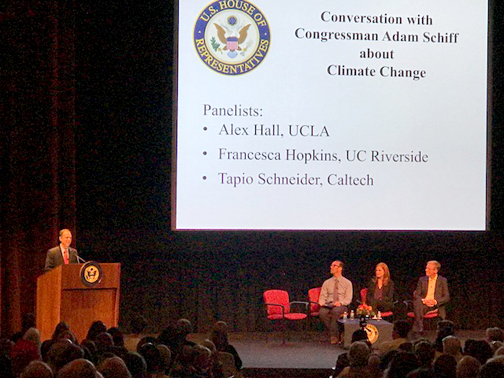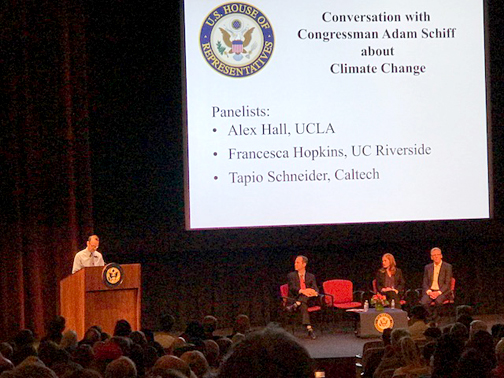By Mary O’KEEFE
In an April meeting, just before the national March for Science, Congressman Adam Schiff hosted a forum on climate change at Caltech in Pasadena. It is important to note the difference between the terms “global warming” and “climate change.”
According to NASA pmm.nasa.gov, global warming is the increase in Earth’s average surface temperature due to rising levels of greenhouse gases. Climate change is a long-term change in the Earth’s climate or of a region on Earth.
Previously the term for “human impact on climate had been called ‘inadvertent climate modification,’” according to NASA. That term, for obvious reasons, did not exactly take off. Then in 1988, NASA scientist James E. Hansen testified in front of Congress about climate, specifically referring to global warming, stating “global warming has reached a level such that we can ascribe with a high degree of confidence a cause-and-effect relationship between the greenhouse effect and the observed warming.”
That testimony was widely reported and the term “global warming” became a catch-all for climate change even though, according to NASA, “temperature change itself isn’t the most severe effect of changing climate.”
The changes to precipitation patterns and sea level are more likely to have a greater human impact than temperature alone. So to use a better and more accurate term would be “global climate change.”
That said, the April forum had three specialists in global climate change. Alex Hall, Ph.D. is a professor in the Dept. of Atmospheric and Oceanic Sciences and Institute of the Environmental and Sustainability and director of the Center for Climate Science at UCLA. Francesca Hopkins, Ph.D. is an assistant professor of climate change and sustainability in the Dept. of Sciences at UC Riverside. And Tapio Schneider, Ph.D. is a professor of environmental science and engineering at Caltech and a senior research scientist at NASA’s Jet Propulsion Laboratory. (For more complete biographies go to www.cvweekly.com.)
“One of the changes that most concerns me is the change that we have seen in the whole perspective on science in the [present] administration,” Schiff said. “The fate of the Paris Climate Agreement hangs very much in the balance.”
The Paris Agreement brought all nations together in a common cause to undertake efforts to combat climate change and to adapt to its effects. Nations agreed to work together with regard to the Earth’s environment including reducing greenhouse gases. Schiff added his concern lies in actions taken by the administration including issuing an executive order to withdraw and rewrite the clean power plan, roll back fuel standards and to abandon a moratorium on new coal leases on public lands.
Schiff hosted the forum to share information on how climate change is affecting the globe and, specifically, the local areas.
Schneider first reviewed what scientists know about climate change.
“We know a few things for certain. We know that carbon dioxide is now higher than it has been at least in the last 800,000 years,” Schneider said. “It is also clear that the Earth should warm more and more … A warmer climate means that windstorms get more intense and, in fact, we have already seen that.”
He said the change might have some beneficial effects “if you want to grow roots in Siberia.” However the present infrastructure has adapted to the way life is now and climate change will and has affected the economy as society adjusts to the changes.
Schneider addressed those who still do not believe climate change is an issue due to the lack of exact rises in temperature.
“I am a scientist and what distinguishes a scientist from a lot of other human activities is that you are asked to be radically honest,” he said.
He added that scientists must share what they know as well as what they do not know. The exact future rise of temperature is not known.
“We don’t know precisely how much warmer the Earth will get as other greenhouse gases go into the atmosphere. The main reason is we do not know precisely how clouds will change as they warm the marine layers,” he said.
So will June gloom be April gloom as well? Schneider asked.
Despite not knowing the exact numbers, there are percentage ranges that can be determined, and it is certain that greenhouse gases do affect the climate.
Hopkins has focused most of her research on methane gas, as opposed to CO2. Methane is a natural gas that contributes about 10% to greenhouse gases.
“The interesting thing about methane is it has a shorter time in the atmosphere,” she said. Methane is a potent warming gas. Hopkins’ study is to find ways to reduce methane, which she said would be easier to do than reducing CO2.
“With CO2, we know where to find it. It’s coming from cars and power plants. With methane, it comes from a lot of places,” she said.
It would take a major and immediate overhaul of all transportation systems and power systems to stop the release of CO2. That is a process that is being worked on as alternative energies are being explored, but Hopkins said methane would be easier to reduce because it has less infrastructure involved. It is looking for methane that Hopkins is focused on, to find “leaks” of methane and stop them.
“We think (the leaks) could be fixed to potentially reduce our greenhouse footprint,” she said.
The auditorium at Caltech was filled to standing room only. Hall thanked everyone for coming to the forum.
“This is such an important conversation. The future of our species is at stake,” he said.
He focused his discussion on local impacts.
“There are many of them, from sea level rising to wildfires. One of the most significant for city dwellers like ourselves is changes in heat. Extreme heat is defined as a day when the high temperature is greater that 95 degrees Fahrenheit,” he said. “The current climate in Pasadena sees about 24 extreme heat days a year on average. By the middle of the century this will climb to something like 50 to 60 days per year and this change will occur no matter how much fossil fuel we burn from [now] to then. This underscores significant change in climate is inevitable and we must adapt to coming changes.”
He said this heat increase is if there are improvements and society follows guidelines like those set forth in the Paris Agreement.
“It is an uncomfortable truth that we, as scientists, are obligated to speak the truth and the reality is there is a certain amount of climate changes that are baked in because of past choices we have already made; however, the story is completely different at the end of the century if we reduce [greenhouse gases] to stop extreme heat days,” he said.
There will also be changes in water sources including the Sierra Nevada snow pack that supplies Californians with fresh water. That too will see a greater decease if the U.S. does not work with other nations to reduce greenhouse gases.
“The stakes and actions that we must take couldn’t be clearer here in Pasadena, in California and elsewhere. Some climate change is inevitable and we must prepare for it. If we wish to avoid the climate changing to a point that by 2100 none of us would recognize it, we have to make serious efforts to move to be carbon free,” he said.


